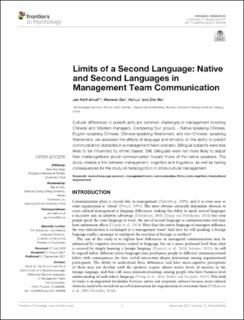| dc.contributor.author | Arnulf, Jan Ketil | |
| dc.contributor.author | Dai, Wanwen | |
| dc.contributor.author | Lu, Hui | |
| dc.contributor.author | Niu, Zhe | |
| dc.date.accessioned | 2021-09-29T11:52:10Z | |
| dc.date.available | 2021-09-29T11:52:10Z | |
| dc.date.created | 2021-09-21T09:40:32Z | |
| dc.date.issued | 2021 | |
| dc.identifier.citation | Front. Psychol., 21 September 2021 | en_US |
| dc.identifier.issn | 1664-1078 | |
| dc.identifier.uri | https://hdl.handle.net/11250/2786022 | |
| dc.description.abstract | Cultural differences in speech acts are common challenges in management involving Chinese and Western managers. Comparing four groups – Native-speaking Chinese, English-speaking Chinese, Chinese-speaking Westerners, and non-Chinese- speaking Westerners, we assessed the effects of language and ethnicity on the ability to predict communication obstacles in a management team scenario. Bilingual subjects were less likely to be influenced by ethnic biases. Still, bilinguals were not more likely to adjust their metacognitions about communication toward those of the native speakers. The study creates a link between management, cognition and linguistics, as well as having consequences for the study of metacognition in cross-cultural management. | en_US |
| dc.language.iso | eng | en_US |
| dc.publisher | Frontiers | en_US |
| dc.rights | Attribution-NonCommercial-NoDerivatives 4.0 Internasjonal | * |
| dc.rights.uri | http://creativecommons.org/licenses/by-nc-nd/4.0/deed.no | * |
| dc.title | Limits of a Second Language: Native and Second Languages in Management Team Communication | en_US |
| dc.type | Others | en_US |
| dc.description.version | publishedVersion | en_US |
| dc.source.journal | Frontiers in Psychology | en_US |
| dc.identifier.doi | 10.3389/fpsyg.2021.580946 | |
| dc.identifier.cristin | 1936401 | |
| cristin.ispublished | true | |
| cristin.fulltext | original | |
| cristin.qualitycode | 1 | |

